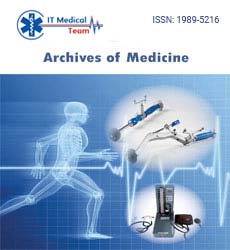Opinion - (2024) Volume 16, Issue 5
General medicine: A comprehensive guide to holistic patient care
Aisha Al Mansouri*
Department of General Medicine, Mohammed Bin Rashid University of Medicine and Health Sciences, Dubai, UAE
*Correspondence:
Aisha Al Mansouri, Department of General Medicine, Mohammed Bin Rashid University of Medicine and Health Sciences, Dubai,
UAE,
Email:
Received: 20-Aug-2024, Manuscript No. ipaom-24-15400;
Editor assigned: 22-Aug-2024, Pre QC No. P-15400;
Reviewed: 03-Sep-2024, QC No. Q-15400;
Revised: 09-Sep-2024, Manuscript No. R-15400;
Published:
16-Sep-2024
Introduction
General medicine serves as the cornerstone of healthcare, focusing on the prevention, diagnosis, and treatment of a wide array of medical conditions. Practitioners in this field, often referred to as internists or family physicians, adopt a holistic approach to patient care, considering not just the physical ailments but also the emotional and social factors that can impact health. As healthcare evolves to meet the needs of diverse populations, the principles of general medicine remain vital in promoting overall well-being. Additionally, the rise of chronic diseases, an aging population, and the increasing complexity of healthcare demands necessitate a strong foundation in general medicine. This field equips practitioners with the skills to manage multiple health issues concurrently while maintaining a comprehensive view of the patient's life. This article aims to provide a comprehensive guide to general medicine, exploring its core principles, the importance of holistic care, and effective strategies for improving patient outcomes [1].
Description
General medicine encompasses a broad range of health issues, addressing everything from chronic diseases like diabetes and hypertension to acute conditions such as infections and injuries. The foundation of this field is built on thorough patient assessments, which include detailed medical histories, physical examinations, and appropriate diagnostic testing. Internists are trained to manage multiple conditions simultaneously, often serving as primary care providers who coordinate referrals to specialists when necessary. One of the defining features of general medicine is its holistic approach to patient care. This means that practitioners look beyond mere symptoms to understand the broader context of a patient's life. Factors such as lifestyle, mental health, family dynamics, and socioeconomic status play crucial roles in an individual's health and well-being [2]. By adopting a patient-centered approach, general medicine practitioners can foster stronger doctor-patient relationships, leading to improved adherence to treatment plans and better health outcomes.
Preventive care is another key component of general medicine. Regular check-ups and screenings allow for the early detection of potential health issues, enabling timely interventions that can prevent more serious conditions from developing. Health education is equally important, empowering patients to make informed decisions about their health and encouraging healthy lifestyle choices. This preventive focus not only enhances individual well-being but also contributes to the overall health of communities [3]. As healthcare systems face new challenges, such as rising chronic disease rates and an aging population, the role of general medicine is becoming increasingly critical. Emphasizing accessibility, continuity of care, and an integrated approach to health management positions general medicine as a vital player in delivering comprehensive healthcare solutions.
Moreover, the integration of technology into general medicine is transforming patient care. Electronic Health Records (EHRs) facilitate better communication among healthcare providers, while telemedicine expands access to care for patients in remote areas [4]. As healthcare systems face new challenges, such as rising chronic disease rates and an aging population, the role of general medicine is becoming increasingly critical. Emphasizing accessibility, continuity of care, and an integrated approach to health management positions general medicine as a vital player in delivering comprehensive healthcare solutions [5].
Conclusion
General medicine plays a pivotal role in ensuring holistic patient care, focusing on the interconnectedness of physical, emotional, and social health. By emphasizing a comprehensive approach to diagnosis and treatment, general medicine practitioners are well-equipped to address the diverse needs of their patients, fostering stronger relationships and improving overall health outcomes. As we look to the future, the principles of general medicine—preventive care, patient education, and a commitment to holistic well-being—will remain essential in navigating the complexities of modern healthcare. By continuing to prioritize these values, we can ensure that patients receive the high-quality, compassionate care they deserve, ultimately leading to healthier communities and a more effective healthcare system.
As we look to the future, the principles of general medicine—preventive care, patient education, and a commitment to holistic well-being—will remain essential in navigating the complexities of modern healthcare. By continuing to prioritize these values, we can ensure that patients receive high-quality, compassionate care tailored to their unique circumstances. Ultimately, a robust general medicine practice will lead to healthier individuals and communities, paving the way for a more effective healthcare system that can meet the challenges of tomorrow. In an increasingly complex world, the emphasis on holistic patient care will not only enhance the quality of life for individuals but also contribute to the sustainability of healthcare systems globally.
Acknowledgment
None.
Conflict of Interest
None.
References
- Karikó K, Buckstein M, et al. Suppression of RNA recognition by Toll-like receptors: the impact of nucleoside modification and the evolutionary origin of RNA. Immunity. 2005 1;23(2):165-75.
Google Scholar, Crossref, Indexed at
- Li C, Lee A, Grigoryan L, et al. Mechanisms of innate and adaptive immunity to the Pfizer-BioNTech BNT162b2 vaccine. Nat Immunol. 2022;23(4):543-55..
Google Scholar, Crossref, Indexed at
- Blakney AK, Ip S, Geall AJ. An update on self-amplifying mRNA vaccine development. Vaccines. 2021 28;9(2):97.
Google Scholar, Crossref, Indexed at
- Blakney AK, McKay PF, Hu K, et al. Polymeric and lipid nanoparticles for delivery of self-amplifying RNA vaccines. J Control Release. 2021 10;338:201-10.
Google Scholar, Crossref, Indexed at
- Li F, Zhang XQ, Ho W, et al. mRNA lipid nanoparticle-mediated pyroptosis sensitizes immunologically cold tumors to checkpoint immunotherapy. Nat Commun. 2023 Jul 15;14(1):4223.
Google Scholar, Crossref, Indexed at






